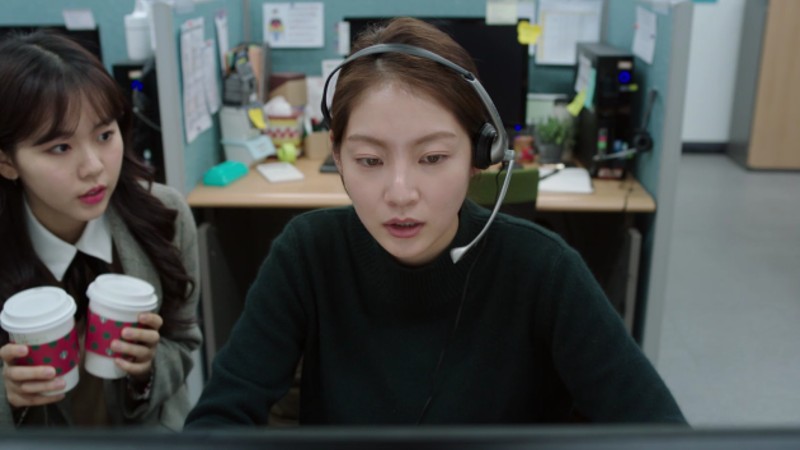




There’s an almost unspoken intensity to Aloners, director Hong Sung-eun’s feature length debut. Such a feeling remains firmly understated throughout its runtime, but at the same time one cannot deny, on occasion, being rather on edge at the onscreen ongoings.
The film follows Yu Jina (Gong Seung-yeon), a fairly young woman who brushes through life in a seemingly secure isolation. In her job as a call operator at a credit card company, she has a settled routine when talking to customers, one which includes minimal engagement yet sees her comfortably at the top of performance charts. In her home life, she excludes her slightly eccentric father from all happenings, only ever appearing when her late mother’s will needs signing off on, and leaving him to live alone. And her social life is nonexistent, consisting of passing comments at an oddball neighbour who discusses cigarette smoke with a strange conviction, and falling asleep to the background sound of the television.
Things swiftly start to change for the permanently headphone wearing introvert, though. First she is tasked with training a bubbly new employee, Su Jin (Jung Da-eun), a rookie eager to fit in and make friends with her supposed mentor. Secondly, the odd neighbour we are exposed to in the opening sequences of the film is deemed to have died, allegedly days before the two last interacted, leaving the protagonist confused as to whether she is truly equipped to live a life cut off from those around her.

What follows is a sober character study of Jina, one both thought-provoking and intriguing. On the surface we see a woman who is rather unsavoury, often being blunt to a near comical degree, and shunning any sort of warm advance. “Do you make a habit of being pissed off all the time?” her new neighbour aptly asks at one stage, a question that is bound to have been on the mind of the viewer as they watch the seemingly prickly recluse consistently act with a degree of coldness towards everyone around her. That is, if she chooses to even give the courtesy of a response.
But, as is usually the case, there is more than meets the eye, and Hong does a consummate job of balancing out Jina’s loner facade with an unravelling realisation that she cannot function without others. Her reversal in mindset is smartly revealed and, when Jina sees the wrong in her ways, culminating in a heartfelt, open interaction with her former co-worker over the phone, it’s seamlessly affecting.
She is a pseudo-victim in all of this, a woman plagued by the effortless convenience of being able to withdraw from society and feign occupation to escape interaction. It’s a point emphasised by an initially comedic phone caller who claims to have invented a time machine to go back to the days of the 2002 World Cup, in turn explaining that people are “too busy now” and that he pines to relive a time in which strangers embraced and hugged, sharing and living in the moment together.
Supplemented by Choi Young-ki’s smart cinematography which shows the potential for connection amongst the chosen isolation, as well as both the literal and metaphorical walls erected in Jina’s life, Aloners is a methodically paced, somewhat provocative release, smartly stripped of needless melodramatic flurries in favour of genuine sentiment.
Aloners showed at the London Korean Film Festival, when this piece was originally written. It also showed at the Tallinn Black Nights Film Festival. On Mubi on Monday, July 11th.
















